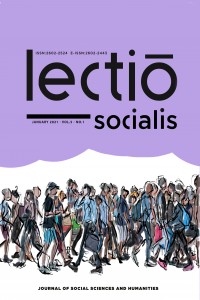Abstract
Barış çalışmaları ve araştırmaları büyüleyicidir çünkü insan ilişkileri, davranış, iş birliği ve çatışmanın sonucu ile ilgili bazı önemli soruları incelemektedir. Peki bu noktada barış nasıl tanımlanmalıdır? Sadece devlet merkezli bir yaklaşım barışı açıklamak için yeterli midir yoksa toplumlar ve bireyler de dahil edilmeli midir? Ortak gelenek, barışı çatışma ve şiddet kavramlarını temelinde kurgulamak, normlar ve ilkeler üretmektir. Başka bir ifadeyle barış olgusu bir zorunluluk olarak kurgulanmakta ve tartışılmaktadır. Bu durumda “kim için ve kiminle barış” sorunsalını ortaya çıkmaktadır. Siyaset bilimi ve uluslararası ilişkiler disiplini de bu tartışmayı açıklamada yetersiz kalmaktadır. Buradan hareketle teori ve pratiği mümkün olduğunca bir araya getiren ve kendine özgü düşünce altyapısıyla barışı toplumsal düzlem ve süreçlerle tanımlamaya çalışan barış çalışmaları alanının öncü kuramcısı Johan Galtung’un genel bakış açısını irdelemek bu araştırmanın amacını oluşturmaktadır.
References
- Bilgin, K. (2018). Johan Galtung. Barış Çalışmaları in (pp. 175–207). Ankara: Adres Yayınları.
- Ercoşkun, B , Konuralp, E . (2020). Change, Transformation, and Trends in Peace Studies . Dumlupınar Üniversitesi Sosyal Bilimler Dergisi, (66) , 187-199 . Retrieved from https://dergipark.org.tr/tr/pub/dpusbe/issue/57463/739123
- Galtung, J. (1964). ‘What is peace research?’ Journal of Peace Research, 1(1), 1–4.
- Galtung, J. (1967). Theories of Peace: A Synthetic Approach to Peace Thinking. Oslo: International Peace Research Institute.
- Galtung, J. (1969). Violence, Peace and Peace Research. Journal of Peace Research, 6(3), 167–191.
- Galtung, J. (1981). Social Cosmology and the COncept of Peace. Journal of Peace Research, 17(2), 183–199.
- Galtung, J. (1985). Twenty five years of Peace Research: Ten Challenges and Some Responses. Journal of Peace Research, 22(2), 141–158.
- Galtung, J. (1990). Cultural Violence. Journal of Peace Research, 27(3), 291–305.
- Galtung, J. (1996). Peace by Peaceful Means: Peace and Conflict, Development and Civilization. London: Sage.
- Galtung, J. (2000). Conflict Transformation by Peaceful Means (The Transcend Method). New York.
- Galtung, J. (2004). Violence, war, and their impact: On visible and invisible effects of violence. Forum for Intercultural Philosophy, 5, 12–32.
- Galtung, J. (2009). Çatışmaları Aşarak Dönüştürmek: Çatışma Çözümüne Giriş. Ankara: Usak Yayınları.
Abstract
Peace studies and research are fascinating because they delve into some of the quintessential questions concerning human relations, behavior, cooperation, and conflict. So how should we define peace at this point? Is a state-centered approach sufficient to explain peace independently, or should we include societies and individuals? The common tradition is to construct peace based on the concepts of conflict and violence, to produce norms and principles. In other words, the phenomenon of peace is conceived and discussed as a necessity. In this case, the question of “peace for and with whom” arises. Political science and the discipline of international relations are also insufficient to explain this debate. From this point of view, this study aimed to examine the general perspective of the pioneer theorist of peace studies, Johan Galtung, who combines theory and practice as much as possible and tries to define peace with the social realm processes with his unique thought infrastructure.
References
- Bilgin, K. (2018). Johan Galtung. Barış Çalışmaları in (pp. 175–207). Ankara: Adres Yayınları.
- Ercoşkun, B , Konuralp, E . (2020). Change, Transformation, and Trends in Peace Studies . Dumlupınar Üniversitesi Sosyal Bilimler Dergisi, (66) , 187-199 . Retrieved from https://dergipark.org.tr/tr/pub/dpusbe/issue/57463/739123
- Galtung, J. (1964). ‘What is peace research?’ Journal of Peace Research, 1(1), 1–4.
- Galtung, J. (1967). Theories of Peace: A Synthetic Approach to Peace Thinking. Oslo: International Peace Research Institute.
- Galtung, J. (1969). Violence, Peace and Peace Research. Journal of Peace Research, 6(3), 167–191.
- Galtung, J. (1981). Social Cosmology and the COncept of Peace. Journal of Peace Research, 17(2), 183–199.
- Galtung, J. (1985). Twenty five years of Peace Research: Ten Challenges and Some Responses. Journal of Peace Research, 22(2), 141–158.
- Galtung, J. (1990). Cultural Violence. Journal of Peace Research, 27(3), 291–305.
- Galtung, J. (1996). Peace by Peaceful Means: Peace and Conflict, Development and Civilization. London: Sage.
- Galtung, J. (2000). Conflict Transformation by Peaceful Means (The Transcend Method). New York.
- Galtung, J. (2004). Violence, war, and their impact: On visible and invisible effects of violence. Forum for Intercultural Philosophy, 5, 12–32.
- Galtung, J. (2009). Çatışmaları Aşarak Dönüştürmek: Çatışma Çözümüne Giriş. Ankara: Usak Yayınları.
Details
| Primary Language | English |
|---|---|
| Subjects | Political Science, International Relations |
| Journal Section | Review Articles |
| Authors | |
| Publication Date | January 18, 2021 |
| Submission Date | September 9, 2020 |
| Acceptance Date | December 17, 2020 |
| Published in Issue | Year 2021 Volume: 5 Issue: 1 |
Cited By
Exploring the centrality of nonviolent communication for resolution of conflicts for a culture of peace
CIC. Cuadernos de Información y Comunicación
https://doi.org/10.5209/ciyc.88593
Lectio Socialis is a prestigious, international, and peer-reviewed journal that aims to provide a platform for scholars and researchers to share their work and ideas on policy-relevant topics related to social sciences. The journal welcomes high-quality articles from a wide range of disciplines, including economics, political science, public administration, business administration, international relations, urban planning, sociology, psychology, history, jurisprudence, and philosophy. The primary objective of Lectio Socialis is to maintain a vibrant, independent, and unbiased environment for scholars and researchers from different parts of the world to present their research, exchange ideas, and contribute to the advancement of knowledge in their respective fields.



